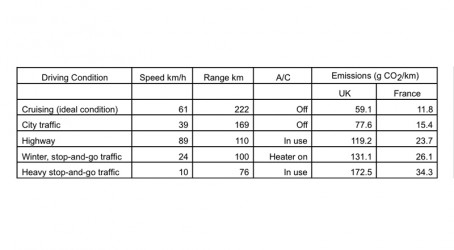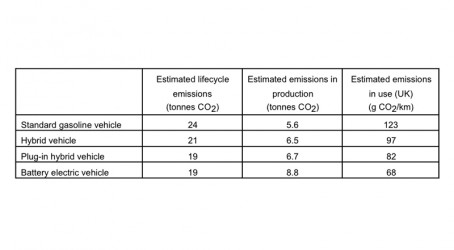Readers letters
Terence Rook asks what the CO2 emissions are for electric cars (PE online 20 November).
This question came up about a year ago (PE September 2011) and the answer has not changed much.
According to data from IEA Energy Balances, in 2009 the UK supplied 320 TW.h of electricity to consumers, using 24.3 million tonne of oil equivalent (Mtoe) of coal, 1.24 Mtoe of oil, 27.6 Mtoe of natural gas, and 22.8 Mtoe of nuclear and renewables. This produced emissions of 0.52 kg of CO2 per kW.h supplied. Because of the high penetration of nuclear power in France, their emissions were 0.10 kg of CO2/kW.h supplied.
The Nissan Leaf has a battery capacity of 24 kW.h and, assuming 95% charger efficiency, emissions per charge would be 13.1 kg in the UK and 2.6 kg in France. The range of the Leaf varies with driving conditions; the US EPA provides the following range data for various driving conditions (I have added the columns for emissions in the UK and France):

My own car, a 9 year old Honda mild hybrid Civic, has covered 174,000 km and used 10,150 litres of petrol. The CO2 produced by burning a litre of petrol is 2.25 kg/litre, giving an average CO2 emission rate of 130 g/km. My previous car, another Honda, covered just over 300,000 km and consumed 23,650 litres of petrol, giving an average CO2 emission rate of 176 g/km.
Based on these data, the CO2 emissions of electric cars in the UK are probably marginally better than a conventional car. However, the electric car has zero tail pipe emissions, which should provide considerable benefits for cities. The picture is different in France, where an electric car has clear environmental benefits over a conventional car; this benefit will also apply when the UK’s electricity supply is decarbonised.
Personally, I doubt whether conventional cars can improve much more, my Civic uses batteries to assist in acceleration, cuts of fuel on closed throttle coasting and the engine cuts out at stops. I did achieve 110 g CO2/km recently but that was at a ‘steady’ 80 km/h on motorways when I drove from York to home on a ‘Space saver’ spare.
Further improvements may achieve another 10 or 20% saving, but all the time the engine is required to work at part load its efficiency is going to be compromised. The most likely option is a range extended electric vehicle with batteries providing power for short journeys and in town and a small engine/generator recharging the batteries on longer journeys.
There does not appear to be any definitive data regarding life cycle CO2 emissions for cars. A press release from the ‘Low Carbon Vehicle Partnership’ includes the following table:

The data assumes a vehicle life of 150,000 km, that the CO2 emissions from electricity production are 500 g/kW.h and the vehicle is built in 2015 (i.e. uses anticipated technology). I have added an extra column showing the estimated emissions in use for each vehicle type.
The ‘in use’ emissions appear to be a bit optimistic, but the authors of the supporting study will have access to data relating to future vehicles.
I hope there are enough numbers for Rook and, as far as I can tell, there is no ‘green wash’. I believe the numbers are correct, the electricity supply values include energy industry own use and transmission losses (equal to about 14% of electricity production). I have based CO2 emissions from power stations on 3.96 tonnes CO2/toe for coal, 2.35 tonne CO2/toe for natural gas and 3.07 tonne CO2/toe for oil.
Robin Trow, Snodland, Kent
Next letter: Engineers are guilty of smugness